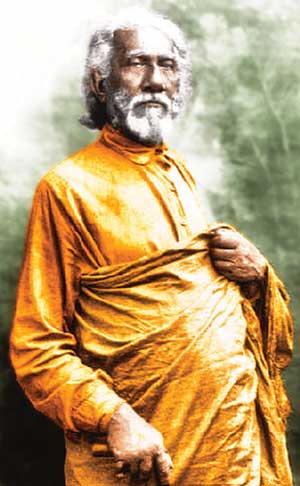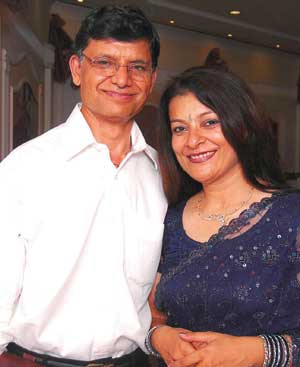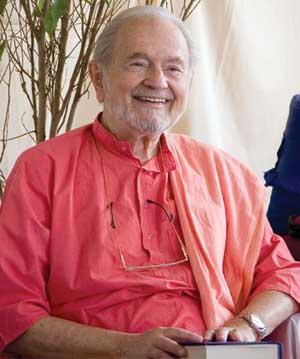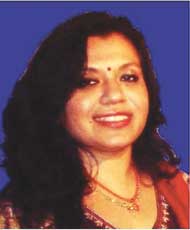- Home
- Archive -Dec 2011
- In the flow of . . .

In the flow of abundance
- In :
- Personal Growth
December 2011
By Nandini Sarkar
Can we shift from being obsessed with money to a state of abundance-consciousness where we attract peace, prosperity, health, happiness and all good things, simply and effortlessly? asks Nandini Sarkar
 |
As I sit enjoying the cool breeze from the lake, the mystic hour of dusk and a refreshing cup of Darjeeling tea, I have a soothing feeling of abundance. If you play a word-imagery game and toss up the word “abundance”, most people would spontaneously say: Money! However, I have always thought of abundance as all-round prosperity brought about by a state of mind. Notice how some people enjoy good health, sufficient money, supportive family bonds, amicable relationships, satisfying business or work prospects, and a decent home they can call their own? Such lives amply manifest abundance-consciousness. Compare the lives of GS and NK: GS is a rich trader with a net worth of nearly Rs 100 crore. However, he suffers from duodenal ulcer and can only eat curd-rice; he has had a series of failed relationships and at one point even contemplated suicide. By his own admission, he has the money and the influence but not the health or the happiness. NK is a mid-level manager in a PSU. He owns a 1,500 sq ft flat in Noida, drives a Santro, is popular at work, looks forward to his daily evening tea with his wife, and is blessed with robust health. A happier man possibly does not exist and NK fits my definition of abundance-consciousness.
The big question is, how can we cultivate an “abundance-consciousness”, that attracts, “what we need, when we need it”, to paraphrase Swami Kriyananda. The scriptures of the world tell us that we are Princes in the Kingdom of God and abundance is ours for the asking, if we are aligned with the laws of God and if we include others in our well-being.
An abundance-consciousness does not hanker after wealth or restlessly pursue it at the cost of all other priorities. Consider this Biblical story: God appeared to the 21-year-old Solomon, who had just ascended the throne, in a dream and granted him a boon. Solomon sought wisdom and right understanding so that he could be a just king. Solomon’s request greatly pleased God, who not only granted him wisdom but also the fame and riches that Solomon had not asked for:
| According to the erudite Swami Satyananda of Devi Mandir, there are two reasons for suffering from a lack of abundance. Sai Baba called it Shraddha and Saburi: Faith and Patience. | ||
‘Because you have not requested riches and honour but only that which would benefit all the people, I will give you not only an understanding heart like none other before or after you … but also riches and honour like no other king in your days.’ Solomon ruled as king for 40 years of peace and prosperity – the golden age of Israel’s history. Indeed, Solomon’s story is a telling reminder why many of us fail to attract abundance – we rarely align to a cause larger than us. If our focus is on serving the world through our work, we often attract wealth and fame as well.
I am still charting my own abundance journey, but when I look back, here are the milestones.
A personal journey
My mother was a profound, benign influence in my childhood. With her vivid stories, she instilled a love for God in us children. God became like a cherished family friend who would always stand by us, rather than a distant object of worship. Mother also talked to us about karma, never missing any opportunity to point out whether we were getting the fruits of our good or bad karma. Another influence was a strong success suggestion planted in my mind when I was in my teens. A one-liner in my astro-chart was read to me in chaste Bengali: this native will be fortunate by the grace of God and Guru. I am grateful to the pundit, because I believed him and dreamt constantly of being in business. In our growing years, my father, an honest civil servant, had limited money, and we had no luxuries at all. But I would look at myself in the mirror and think that a successful entrepreneur was looking back at me. I read avidly about the spiritual Masters and mentally broadcast my loving thoughts to them, fervently seeking their help to manifest my dreams.
However, when it came to the crunch, it was not easy. I had taken five years off after my marriage, to raise our two children, quitting a lucrative banking job, much to my father’s agony. After marriage, I got involved in a construction business, set up primarily to aid my brother-in-law, who had been forced to leave his job. The first building project was successfully negotiated by my husband, a banker, and both of us invested to get this venture going. However, after the project was completed, my brother-in-law was not interested in working jointly. Believing his need to be greater than mine, I quit. Frankly, I had no idea at that juncture, what business to launch next, except that I wanted to be in the service industry. There were many fearful, agonising moments but I did not want to give up, so I tried my luck with IT recruitments. The second effort did not succeed and I lost a little capital, but I was ready for another attempt.
Sri Yukteshwar Giri said: look fear in the face and the unwelcome visitor will soon flee! The third time around, we chose management consulting and launched a new private limited company, C-Quel, in March 2001. The vision was to create a reputed, professional services company, useful to many, so we resisted suggestions from family to start small or to set up a partnership firm. I still remember knocking on many doors for work, swallowing my pride. Fortunately, C-Quel bagged a major Pan-India contract within the first month of her existence, greatly lifting our morale. Today, we work in all the major Tier I and multiple Tier II cities in India and have celebrated 10 years of C-Quel’s existence this year.
Faith and service
 |
In our 10-year journey, there have been fires, betrayals, delays in bagging coveted contracts and other challenges, but I would not have lived differently. I learnt about the technical and financial sides of running a business, team building and relationship building. I was very bad at handling money, preferring to leave it to my mother or husband, but for C-Quel, I was forced to get on the learning curve. I made stupid mistakes, was sometimes cheated but I never wanted to stop learning. My experiences have convinced me that faith and a sense of service attract the right advisors, the right team, the right situations and the right amount of abundance in our lives.
This aspect of abundance is also highlighted by Swami Satyananda Saraswati of Devi Mandir. An American by birth, he is often referred to as, “The Sahib Sadhu”. Swamiji’s life demonstrates all-round abundance: a brilliant student, he earned coveted US college degrees, had a very successful corporate career and became the foremost disciple of Shree Maa. Today, thousands of American homes have learnt the efficacy of puja and mantra as a route to well-being, thanks to Swamiji’s personal example. When asked about his secret, Swamiji said: “When I go into a deal or almost any transaction, my concern is what value I can add to others’ positions. I have full faith that God is going to reward me with the fruit of my karma. We arrived in the USA without a penny, and today we are invested in the global economy.”
When one possesses an abundance-consciousness, adverse circumstances challenge rather than impede. Take the case of Dhirubhai Ambani, Bill Gates, Steve Jobs or Prannoy Roy. They set up their businesses in garages and skyrocketed to wealth and fame. Knock and the door shall be opened, says the Bible.
Against the odds
I had always thought of M’s wife as a timid, nondescript mouse. M, a successful solicitor, had a tragic death from cancer at 42. To my open-mouthed astonishment, this mouse showed up one day at my office, glowing in a pink sari and diamond studs. She had decided not to mope and was meeting his clients along with a trusted lieutenant, telling them that the firm was still operational and that she was in charge. She had also enrolled for a law degree and had converted a large part of their property into a guest
| Sri Yukteshwar Giri said: look fear in the face and the unwelcome visitor will soon flee! | ||
house, to keep the domestic fires burning. I wanted to get up and hug her for being so courageous. She was like a person reborn, bravely tackling the situation instead of complaining about misfortune. She said the Divine Mother had given her an advance premonition of her husband’s death and that she trusted Mother to take care of her family.
Another person whose abundance-consciousness enabled him to prevail over staggering odds is JTA Singh, a pious Tamil Christian with a Sikh name. JTA suffered abject humiliation while at Madras University because he could not speak English. Instead of falling into depression or blaming his underprivileged origins, he made the effort, burned the midnight oil, learnt English and graduated with distinction in Economics. Accepting a job with a stock-broking firm at Kolkata, he soon won the trust of the owners with his honesty and business acumen. After a few years, he had earned sufficient capital to set up his own broking firm. Miraculously, he was able to buy a large office in the posh Park Street area of Kolkata at a ridiculously low price. JTA offers free financial advisory services to schools and colleges in the Diocese of Kolkata and organises faith camps. The last camp was attended by nearly a lakh delegates.
When V’s professor husband started a live-in relationship openly with a student in their home, she didn’t take it lying down. Seeking my father-in-law’s help, she drove the husband out of their home and won a legal battle establishing her rights on the property. She took up a teaching job. V educated her son and kept him busy with a multitude of activities, not wanting him to feel his father’s absence. She would seek counsel from my father-in-law, sometimes waiting patiently for hours for an audience but would not leave without getting her job done. Bring it on! said this doer to life, as she re-built her home from the ashes. Her son met me some days ago, happily married, with a steady job and no emotional baggage. We both remembered his deceased mother with admiration.
Scarcity-consciousness
 |
What makes abundance-consciousness so scarce a phenomenon? How is it that most of us are caught up in its polar opposite, scarcity-consciousness? The answer to that is wide-ranging.
At the heart of it, though, is our subscription to the philosophy of materialism. Almost all of us believe that we live in a material universe and that resources are scarce. Thus arises the need to fight for marks, status, for possessions, territory and prestige. This consciousness has created an exclusivist culture whose premise is that one’s status and prestige are directly correlated to the number of people who are excluded from the privileges one has access to. Clubs, five-star hotels and high society memberships are particularly governed by this odious belief.
Recognising that we live in a spiritual universe which is, in fact, the source of the material one is the necessary antidote for combatting this philosophy. This awareness is a paradigm shift of such enormous proportions that it takes a great deal of time for its implications to sink through. Gradually, we discern the spiritual laws that govern life on earth. We discover that our thoughts and subsequent feelings are the founding stones of our destiny. Random existence is not responsible for giving us that coveted job or that illness. We ourselves have created it. We are the masters of our fate, good or bad.
From this we recognise that the more we adhere to the laws of life, the greater our mastery over life. The greater our mastery over life, the more the abundance that pours into our lives. Our lives are potentially abundance personified, but it is left to us to turn on the tap, so to speak. Scarcity is an illusion; abundance is the shining reality.
Hurdles on the path
The hurdles that come in the way of our journey to abundance are the following:
Fear is said to be an energy that vibrates at one of the lowest levels, and is considered the polar opposite of love which is an energy that vibrates at the highest level. Fear roots us within the ego and causes us to retreat, contract and disengage from life. Says a seeker who has been battling with scarcity-consciousness for a long time. “Each time I think of spending money either on myself or others, I feel a deep sense of fear and anxiety. This causes me to either not spend the money or to choose a cheaper option. I end up never buying quality products and am notoriously behindhand on buying gifts for family and friends!”
A low sense of self-worth is another infamous abundance tripper. We do not feel worthy of abundance and therefore do not aspire for it or even actively sabotage it when it comes our way. Sanjana De Sousa (name changed) a journalist, confesses that whenever she applies for a new job she can never get herself
| In our growing years, my father, an honest civil servant, had limited money, and we had no luxuries at all. But I would look at myself in the mirror and think that a successful entrepreneur was looking back at me. | ||
to ask for what she knows she deserves. Sanjana also has a king’sransom in gold jewellery gifted to her by her late mother but refuses to wear any of it because she feels unworthy of it. Naturally, while others less capable have skipped up the success chart, Sanjana remains spiked at close to bottom.
“Make space for abundance,” exhorts the accomplished life skills coach, GL Sampoorna for those with low self-esteem. She suggests a simple, two-step technique.
The first step is to look for something that clutters your physical space and let it go – give it away or trash it. It could be something as small as an old file or a bunch of papers or some clothing. Anything at all to demonstrate to your unconscious that you are willing to let go and have begun the process. Look into the mirror and affirm, “I am willing to let go. I am willing to change.”
The next step would be to start noticing the abundance around you. Notice the abundance of leaves on the trees, the abundance of the ocean, the abundance of the grains of sand, of grains in your kitchen. Practice becoming aware of abundance around you. Affirm, “I am open to and I receive the abundant good this Universe offers me.”
A miserly disposition
A third factor that can divert abundance-consciousness is a lack of ethics or a miserly disposition. SS, a neighbourhood acquaintance, quit studies after Secondary School to support the family and set up a cable TV business. SS seemed to have a Midas touch and the cable TV business was soon diversified to an enormous distributorship business and real estate. But their family was notoriously miserly. Their workers were badly paid, there were whispers of illegal transactions and a profligate lifestyle even after SS was married. Some days ago, we were pained to learn that he is neck deep in debt and is being chased by creditors.
Lakshmi, the goddess of wealth, is called Chanchala, restless, and we are warned to be careful about our actions because she may decide to leave any moment. Swami Vivekananda said that those who are miserly or have not learnt to give will definitely suffer poverty. Frequently, I see genteel people haggling with fruit and vegetable vendors or with plumbers and mechanics. Debates will rage for hours over Rs 10 or 20. Such hagglers are surely unlikely to achieve a prosperity-consciousness?
Wasting water, electricity or other natural resources are also strict spiritual no-nos! I remember my mother-in-law telling me to open the tap in a trickle rather than a flood to save water. Waste not and want not! I have also noticed that business debacles have come when pride has surfaced in my mind after a good business run or when I have been unfair or high-handed with co-workers. Once bitten, twice shy, so my prayer these days is: let others take advantage of me if they will, but let me never be unfair or unjust to others.
 VK Sood and his beautiful wife: Life lived abundantly VK Sood and his beautiful wife: Life lived abundantly |
According to the erudite Swami Satyananda of Devi Mandir, there are two reasons for suffering from a lack of abundance. Sai Baba called it Shraddha and Saburi: Faith and Patience. The lack of faith and patience is what prevents us from performing sadhana materially and spiritually, says Swamiji. Ganesha stands at the door. No one can enter without His approval. Gana means wisdom; Isha is the Lord. No one can enter into the sanctum of success without wisdom. When he is satisfied that we have studied the circumstances sufficiently to perform the right actions, for the right reasons, with the right motivation, full of inspiration, with great energy, and total focus and attentiveness, then he allows us entrance and gives us the fruits of our karma. He becomes Siddhi Vinayak, who removes all obstructions to the attainment of perfection. He brings our projects to fulfilment, until we are able to commit to the ultimate project of self-realisation, concludes Swamiji, with his trademark verve.
When courting abundance therefore, we need to work on our fear, our self-esteem, our generosity, faith and patience. When large-heartedness springs from within us, we will know that abundance is not far away.
The role of tithing
In his book, Money Magnetism, Swami Kriyananda strongly recommends tithing or giving to others as a spiritual practice. He also throws light on the famous Biblical saying that it is easier for a camel to enter the eye of a needle than for a rich man to enter the Kingdom of God.
Says Swamiji, ‘The word, camel, is a mistranslation from the original Greek. It should have been rope (camilos) instead of camel (camelos). It is possible for a rich man to enter the divine kingdom if he gives generously to those in need, and helps worthy causes. In this case, his wealth does not cling to his ego. The whole spiritual journey must be understood in terms of releasing the ego’s hold.’ He also explains that while an entire rope could not be fed through the eye of a needle, the filaments of which the rope is composed can indeed be passed through that eye, if the rope were broken apart!
My maternal grandfather, Benoy Bhushan Ghosh, is an outstanding example of one who lived by abundance-consciousness. He was a wealthy, first-generation Bengali businessman. A bright student, he wept copiously when his father, a poor headmaster in Dhaka, could not pay the fee of Rs 13 for his engineering course. Providence intervened in the form of his teacher’s wife, who pawned her gold bangle to pay his admission fee. After becoming an engineer, Benoy bagged a contract for construction work on the Dhaka airport.
| ‘It is possible for a rich man to enter the divine kingdom if he gives generously to those in need, and helps worthy causes. In this case, his wealth does not cling to his ego.’ | ||
For his first project, he was his own engineer and labourer rolled into one, because he had no capital to engage workers. The Dhaka business flourished. Then, the Partition of 1947 took away everything and he fled with his family to Calcutta, again building business from scratch. Benoy was instrumental in shaping the prominent Park Circus area of Calcutta, which is equally populated by Hindus and Muslims. Many young men were supported by him to set up their own shops or to pay for their education. His wife, Indu Prabha, was perennially engaged in Puja, somewhat indifferent to household matters. Benoy was a considerate husband and he was also grateful for her stoic support during the Partition. So, this busy businessman would make up for his wife’s neglect of family, getting up at dawn to pack tiffins for their seven children and send them to school. There is a Sanskrit saying that abundance manifests wherever women are respected and cared for.
Respecting money
My grandpa was also very particular about food and money not being wasted. You had to clean your entire plate of food – not a single grain could be wasted because each grain was a gift from Lakshmi’s granary. Similarly, every paisa of money had to be accounted for and spent wisely. He would write down each expense in his red ledgers, no matter how small the expenditure. But he was never mean; as long as he lived, everyone enjoyed an opulent lifestyle.
I have seen similar traits in my mother. My father was dumbstruck when she handed him a cheque of Rs two lakh on the eve of my marriage. Unknown to him, she had quietly gathered the small change and small currency notes strewn around by him, invested the money in PPF for years and hey presto! So when we respect and value money we are duly rewarded.
Nishkama karma
 |
SP Biswas is an example of a person who achieved abundance though nishkama karma or work without anticipating any return. He overcame the confines of a lower middle class family and rose to a position of amazing influence in his career, holding the highest positions in government and also acting as India’s Economic Counsellor in Washington DC. He is called paropkari and hridayvan: a do-gooder and a Greatheart. SPB will literally embarrass you by helping you. He will rarely call you for a return favour. His motto, expressed with an ever present smile is: one good service a day!
People laughed, when back in the 1980s, VK Sood spoke of saving the environment, planting trees in the colony or water harvesting. Today, as Executive Director of India’s biggest oil company, he has forged ahead in his corporate career, on the strength of his integrity, commitment to the company and sincere advocacy of corporate social responsibility. I like to think that his strong advocacy for saving natural resources and his penchant for always wanting to make a difference to the lives of employees have helped him prosper.
Karma and abundance
Are some people specially chosen for divine favours and dispensation? Well, yes and no. The Hindus and Buddhists have always believed in reincarnation as part of their spiritual tradition and in the New Age, reputed medicos have proved this through extensive studies on past-life regression. In her several books, such as Dancing in the Light, Sage-ing while Age-ing, and Camino, Shirley Maclaine, the renowned Hollywood actress, recounts several past lives. Interestingly, she had been an artiste in earlier lives, though she had not been well known or wealthy. But her past-life efforts and passion seem to have put her on the fast track to success in her present life. In his book, Born Again, Dr Walter Semkiw, MD, states that the famous actor, Amitabh Bachchan, often called The Actor of the Millennium, had been an acclaimed Shakespearean actor in a previous life.
However, a karmic handicap is by no means to be viewed as a permanent impediment to abundance. Swami Kriyananda explains that if in past lives you were selfish, that would certainly have set up a karmic reaction that would prevent you, in this life, from achieving abundance easily. However, what it means is that we shall have to struggle extra hard. If that bad karma has been due to selfishness, generosity in this life will help very much to cancel out that load. What you give out to the universe, through others, returns to you a thousand-fold. Eventually, if not immediately, this principle will prove infallible.
Money mantras
 Nandini Sarkar is co-founder, C-Quel, a management services company. She is a lover of the spiritual masters and follower in the Kriya Yoga tradition. Nandini Sarkar is co-founder, C-Quel, a management services company. She is a lover of the spiritual masters and follower in the Kriya Yoga tradition. |
Suresh Padmanabhan, whose mission is to communicate ancient Indian techniques governing abundance, teaches Sankalpa Siddhi – the power of firm resolve or intention, using the ancient Indian techniques of mantra and meditation. He suggests that abundance seems to elude many ‘good’ people who can be helped by the use of mantras and gemstones if used with wisdom and obtained from the right source.
Suresh recommends the following mantras and energy ritual for prosperity:-
1. Kubera Mantra http://www.youtube.com/watch?v=RVevnXD4Fig
Listening to the Kubera Mantra blesses one with attracting new avenues and sources of income and wealth. You may choose to hear it once in the morning and once in the evening for best results.
2. Narasimha Stotram http://www.youtube.com/watch?v=KpC2wfiQOAw
This mantra has an amazing vibration, which will give relief to people who have debts and are struggling with money at this present point of time. Listen to this mantra daily for best results.
3. Energy ritual
In the morning, first look at both the palms of your hands. The tips of the fingers represents Lakshmi or money and wealth. Focus on the thought that, ‘Money will flow effortlessly in my life’. The centre represents Saraswati or Learning. Give yourself a thought that, ‘I am attracting the perfect learning in my work or business and mastering the required skill’. Learning is the Bramha-astra or the most potent tool to success. The wrist represents Govinda or Vishnu energy. Give yourself a thought that, ‘I am operating from my Higher Self’. Finally, rub the hands, and take the energy on to your face. Enlightened masters also say that when you get up in the morning and repeat the one-line mantra, ‘Om Namo Narayana’, seven to 11 times, it will give you tremendous power.
Swami Satyananda of Devi Mandir gives a robust interpretation of the Mahalakshmi Strotram. Laksha means goal and goals are what we hold dear to ourselves. In this sense, Mahalakshmi is the Goddess of Wealth, not necessarily sitting on the cash register but guiding the values and goals of our lives. When we recite the Mahalakshmi Ashtakam Strotram, we are given the privilege to organise our priorities, budget our resources and to undertake the sankalpa to pursue the completion of those goals.
So the scriptures, the saints and the achievers are telling us to align ourselves spiritually and to make a practical effort.Being in tune with the spirit helps us to overcome fear paralysis and attracts the right circumstances. Spirituality also helps us to develop the heart chakra, that attracts the right people in our lives and the ajna chakra, the seat of intuition and will power in our bodies. Said Swami Vivekananda: Purity, patience and perseverance are the three essentials to success and of course, love. So do go out there and attract all the abundance you need, to lead a joyous life.
To read more such articles on personal growth, inspirations and positivity, subscribe to our digital magazine at subscribe here
Life Positive follows a stringent review publishing mechanism. Every review received undergoes -
- 1. A mobile number and email ID verification check
- 2. Analysis by our seeker happiness team to double check for authenticity
- 3. Cross-checking, if required, by speaking to the seeker posting the review
Only after we're satisfied about the authenticity of a review is it allowed to go live on our website
Our award winning customer care team is available from 9 a.m to 9 p.m everyday
The Life Positive seal of trust implies:-
-
Standards guarantee:
All our healers and therapists undergo training and/or certification from authorized bodies before becoming professionals. They have a minimum professional experience of one year
-
Genuineness guarantee:
All our healers and therapists are genuinely passionate about doing service. They do their very best to help seekers (patients) live better lives.
-
Payment security:
All payments made to our healers are secure up to the point wherein if any session is paid for, it will be honoured dutifully and delivered promptly
-
Anonymity guarantee:
Every seekers (patients) details will always remain 100% confidential and will never be disclosed
